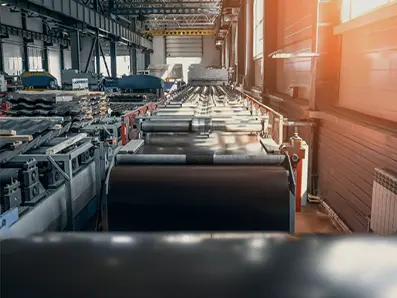Tel: +86-532-84673097
Mobile & Whatsapp & Wechat:+86-13589340409
Mobile & Whatsapp & Wechat:+86-13589340409
Conveyor belts are indispensable tools in modern industry, enabling efficient material transport across various sectors. As a leading conveyor belt manufacturer in China, Rentone Belt is committed to delivering high-quality conveyor belt solutions to customers worldwide. This guide explores the working principles, key components, types, applications, and benefits of conveyor belts, while addressing common questions to help you better understand this critical technology.
A conveyor belt is a continuous moving band made from durable materials like fabric, rubber, or steel cords. It is used to transport materials from one point to another efficiently—whether horizontally, inclined, or vertically.
A conveyor belt system operates on a simple mechanical principle: a continuous belt loops around two or more pulleys, with at least one pulley driven by a motor. Here’s a brief overview of how it works:
Driving Mechanism: A motor powers the drive pulley, and friction between the pulley and the belt causes the belt to move.
Continuous Loop: The belt forms a closed loop, allowing materials placed on it to be transported from the starting point to the endpoint.
Support System: Rollers or idlers beneath the belt support heavy loads and reduce friction, ensuring smooth operation.
For example, in a warehouse, conveyor belts can swiftly move packages from sorting areas to loading zones, significantly boosting efficiency.
A complete conveyor belt system consists of several critical components that ensure efficient operation:
| Component | Function |
| Motor Drive | Powers the drive pulley, typically equipped with speed controllers for varied operational needs. |
| Drive Pulley | Transfers power to the belt, controlling its movement direction and speed. |
| Conveyor Belt Material | The primary medium for carrying materials, made from rubber, PVC, nylon, or steel cords, depending on the application. |
| Idler Rollers | Support the belt, reduce friction, and extend belt lifespan. |
| Conveyor Frame | The structural support, usually made of steel or aluminum, ensuring stability. |
| Control System | Manages belt speed, direction, and automation, often integrated with sensors and PLCs. |
These components can be customized based on industry requirements, such as sanitary materials for food processing or high-strength steel cords for mining.
Conveyor belts are categorized by material, load capacity, and application. Rentone Belt offers a range of high-quality products to meet diverse industry needs:
Fabric Conveyor Belt: Includes EP and NN types, as well as belts resistant to heat, fire, oil, and chemicals — widely used in general material handling, packaging, and processing industries.
Steel Cord Conveyor Belt: Designed for long-distance, heavy-load transport; includes anti-tear, fire-resistant, and bucket elevator types, ideal for mining and bulk material industries.
Solid Woven Conveyor Belt: Durable and flame-resistant belts such as PVG and PVC, commonly used in underground mining, coal handling, and harsh working conditions.
Special Conveyor Belt: Tailored solutions like sidewall, patterned, and steep angle belts for inclined or vertical transport and specific operational needs.
Tubular Conveyor Belt: Fully enclosed design to prevent material loss and control dust, suitable for environmentally sensitive or powdery bulk materials.
Choosing the right conveyor belt involves considering the type of material being transported, environmental conditions (e.g., temperature or chemicals), load size, and transport speed. Rentone Belt’s expert team can assist in selecting the optimal solution.

Conveyor belts serve multiple functions in industrial settings, including:
Transportation: Moving materials from one location to another, covering short or long distances.
Assembly: Supporting continuous production lines in manufacturing.
Sorting: Distributing materials to different areas, common in logistics and e-commerce.
Loading/Unloading: Simplifying processes in warehouses, ports, and distribution centers.
Conveyor belts are widely used in the following industries:
| Industry | Application Examples |
| Manufacturing | Assembly lines, parts transport |
| Mining | Heavy material transport (e.g., coal, ore) |
| Agriculture | Crop handling, packaging |
| Pharmaceuticals | Hygienic transport of medical supplies |
| Food Processing | Food production, packaging, ensuring sanitary standards |
| Logistics & Warehousing | Order fulfillment, inventory management |
Conveyor belts offer significant benefits to businesses, including:
Improved Efficiency: Automates material handling, reducing manual labor and increasing production speed.
Enhanced Safety: Reduces the need for heavy lifting, lowering workplace injury risks.
Versatility: Customizable to suit various materials and environments.
Durability: With proper maintenance, conveyor belts can last for years, minimizing replacement costs.
Cost-Effectiveness: Lowers labor costs and optimizes operational efficiency.
These advantages make conveyor belts an ideal choice for businesses ranging from small factories to large logistics hubs.
1. How do conveyor belts improve efficiency?
They automate material handling, reduce labor costs, and enhance productivity and safety.
2. What safety features do conveyor belts have?
Features include emergency stop buttons, pull cords, belt misalignment switches, and speed switches.
3. How to choose the right conveyor belt?
Consider material type, environmental conditions, load size, and speed. Rentone Belt offers expert consultation.
4. What maintenance do conveyor belts require?
Regular checks for wear, tension adjustments, cleaning, and part replacements. Rentone Belt provides maintenance services.
5. What makes Rentone Belt’s conveyor belts unique?
Our belts are ISO14001 and CE certified, rigorously tested with advanced equipment to meet international standards and customer needs.
Conveyor belts are a cornerstone of efficient material handling across industries. By understanding their working principles, components, and applications, businesses can leverage this technology to boost efficiency and safety. Rentone Belt, as an industry leader, offers a diverse range of conveyor belt products to meet global demands. Our products are rigorously tested and certified to ensure long-term reliability and performance.